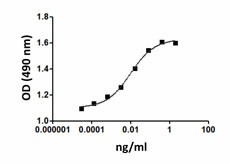- Regulatory Status
- RUO
- Other Names
- Granulocyte/macrophage-colony stimulating factor, CSF-α, Pluripoietin-α, Eosinophil colony stimulating factor (Eo-CSF), Burst promoting activity (BPA)

-

FDC-P1 cell proliferation induced by mouse GM-CSF. -

Recombinant mouse GM-CSF induces the proliferation of mouse FDC-P1 cell line in a dose dependent manner. BioLegend’s protein was compared side-by-side to the leading competitor’s equivalent product.
| Cat # | Size | Price | Quantity Check Availability | ||
|---|---|---|---|---|---|
| 576302 | 10 µg | $147.00 | |||
| 576304 | 25 µg | $253.00 | |||
| 576306 | 100 µg | $762.00 | |||
| 576308 | 500 µg | $1992.00 | |||
GM-CSF is a hematopoietic factor that is produced by T cells, macrophages, fibroblasts and endothelial cells. This multifunctional cytokine stimulates progenitor cells of neutrophils, eosinophils and macrophages. GM-CSF is also a differentiation and activating factor for granulocytic and monocytic cells.
Product Details
- Source
- Mouse GM-CSF, amino acids Ala18-Lys141 (Accession # NM_009969) was expressed in E. coli.
- Molecular Mass
- The 125 amino acid N-terminal methionylated recombinant protein has a predicted molecular mass of 14.2 kDa. The DTT-reduced protein migrates at approximately 13 kDa and the non-reduced protein migrates at approximately 11kDa by SDS-PAGE.
- Purity
- Purity is >98%, as determined by Coomassie stained SDS-PAGE.
- Formulation
- 0.22 µm filtered protein solution is in 10mM NaH2PO4, 150mM NaCl, pH 7.2.
- Endotoxin Level
- Endotoxin level is <0.1 EU/µg (<0.01ng/µg) protein as determined by the LAL method.
- Concentration
- 10 and 25 µg sizes are bottled at 200 µg/mL. 100 µg size and larger sizes are lot-specific and bottled at the concentration indicated on the vial. To obtain lot-specific concentration and expiration, please enter the lot number in our Certificate of Analysis online tool.
- Storage & Handling
- Unopened vial can be stored between 2°C and 8°C for up to 2 weeks, at -20°C for up to six months, or at -70°C or colder until the expiration date. For maximum results, quick spin vial prior to opening. The protein can be aliquoted and stored at -20°C or colder. Stock solutions can also be prepared at 50 - 100 µg/mL in appropriate sterile buffer, carrier protein such as 0.2 - 1% BSA or HSA can be added when preparing the stock solution. Aliquots can be stored between 2°C and 8°C for up to one week and stored at -20°C or colder for up to 3 months. Avoid repeated freeze/thaw cycles.
- Activity
- The ED50 is <0.05 ng/ml, corresponding to a specific activity >2x107 units/mg.
- Application
-
Bioassay
- Recommended Usage
-
Use when high specific biological activity is required.
- Application Notes
-
BioLegend carrier-free recombinant proteins provided in liquid format are shipped on blue-ice. Our comparison testing data indicates that when handled and stored as recommended, the liquid format has equal or better stability and shelf-life compared to commercially available lyophilized proteins after reconstitution. Our liquid proteins are verified in-house to maintain activity after shipping on blue ice and are backed by our 100% satisfaction guarantee. If you have any concerns, contact us at tech@biolegend.com.
-
Application References
(PubMed link indicates BioLegend citation) - Product Citations
-
Antigen Details
- Structure
- cytokine
- Distribution
-
T cells, monocytes/macrophages, fibroblasts, endothelial cells, mast cells
- Function
- Synergistic with IL-1, IL-3, G-CSF; E21R competitive antagonist for receptor binding; stored in ECM with heparan sulfate proteoglycans
- Interaction
- Granulocyte/macrophage/erythroid/megakaryocytic progenitors, myeloblasts, monoblasts
- Ligand/Receptor
- Heterodimer GM-CSFR µ subunit (CDw116); β-subunit (CDw131) in common with IL-3R, IL-5R
- Bioactivity
- Growth/development granulocyte/macrophage progenitors; differentiates myeloblasts/monoblasts; synergizes with Epo proliferation of erythroid/megakaryocytic progenitors
- Cell Type
- Embryonic Stem Cells, Hematopoietic stem and progenitors
- Biology Area
- Cell Biology, Stem Cells
- Molecular Family
- Cytokines/Chemokines, Growth Factors
- Antigen References
-
1. Fitzgerald K, et al. Eds. 2001. The Cytokine FactsBook. Academic Press San Diego.
2. Demetri G, et al. 1991. Blood 78:2791.
3. Fan D, et al. 1991. In vivo 5:571.
4. Negrin R, et al. 1992. Adv. Pharmacol. 23:263. - Gene ID
- 12981 View all products for this Gene ID
- UniProt
- View information about GM-CSF on UniProt.org
